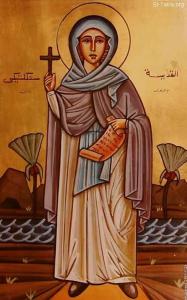For me the wisdom of the Desert Fathers and Mothers is a rich source out of which I not only appreciate the deep mystical traditions of Christianity, but which often directly touches my life as a Zen Buddhist.
Somewhere along the line I became aware of Amma (mother) Syncletica. She lived roughly between the middle of the fourth century and the middle of the fifth. She was the subject of a hagiography attributed for many years to Athanasius of Alexandria. And, perhaps, most important twenty-eight of her sayings were preserved in the Apophthegmata Patrum.
While her name has been removed from the Roman Catholic calendar, she continues to be celebrated in the Coptic, Orthodox, and Anglican communions.
I’ve had difficulty finding the sayings, although I did turn up a dozen.
Like all such things a bit of mixed bag. But, genuine wisdom shows through, and well worth a read by anyone walking the intimate way…
Some Sayings of Amma Syncletica of Alexandria:
1. “In the beginning there is struggle and a lot of work for those who come near to God. But after that there is indescribable joy. It is just like building a fire: at first it is smoky and your eyes water, but later you get the desired result. Thus we ought to light the divine fire in ourselves with tears and effort.”
2. “Those who put out to sea at first sailed with a favourable wind; then the sails spread, but later the wind becomes adverse. Then the ship is tossed by the waves and is no longer controlled by the rudder. But when in a little while there is calm, and the tempest dies down, then the ship sails on again. So it is with us, when we are driven by the spirits who are against us; we hold to the cross as our sail and so we can set a safe course.”
3. There is an asceticism which is determined by the enemy and his disciples practise it. So how are we to distinguish between the divine and royal asceticism and the demonic tyranny? Clearly through its quality of balance.”
4. “I think that for those living in community obedience is a greater virtue than chastity, however perfect. Chastity carries within it the danger of pride, but obedience has within it the promise of humility.”
5. Someone asked, “Is absolute poverty perfect goodness?” She replied, “It is a great good for those capable of it; even those who are not capable of it find rest for their souls in it though it causes them anxiety. As tough cloth is laundered pure white by stretched and trampled underfoot, so a tough soul is stretched by freely accepting poverty.”
6. “We ought to govern our souls with discretion and to remain in the community, neither following our own will nor seeking our own good. We are like exiles: we have been separated from the things of this world and have given ourselves in one faith to the one Father. We need nothing of what we have left behind. There we had reputation and plenty to eat; here we have little to eat and little of everything else.”
7. “In the beginning there are a great many battles and a good deal of suffering for those who are advancing towards God and, afterwards, ineffable joy. It is like those who wish to light a fire. At first they are choked with smoke and cry, until they obtain what they seek. As it is written, “Our God is a consuming fire” (Hebrews 12:24); so we also must kindle the divine fire in ourselves through tears and hard work.”
8. “There are many who live in the mountains and behave as if they were in the town, and they are wasting their time. It is possible to be a solitary in one’s mind while living in a crowd, and it is possible for one who is a solitary to live in the crowd of his own thoughts.”
9. “Choose the meekness of Moses and you will find your heart which is a rock changed into a spring of water.”
10. “Just as a treasure that is exposed loses its value, so a virtue which is known vanishes; just as wax melts when it is near fire, so the soul is destroyed by praise and loses all the results of its labour.”
11. “Just as one cannot build a ship unless one has some nails, so it is impossible to be saved without humility.”
12. “It is dangerous for anyone to teach who has not first been trained in the practical life. For if someone who owns a ruined house receives guests there, he does them harm because of the dilapidation of his dwelling. It is the same in the case of someone who has not first built an interior dwelling; he causes loss to those who come. By words one may convert them to salvation, but by evil behaviour, one injures them.”
The source of my source cites http://www.monachos.net/content/patristics/patristictexts/223-syncletia-sayings?format=pdf. Sadly the link no longer works.
I also found a Youtube video that contains a different translation, and may be all of them. It follows a brief video about her below…













